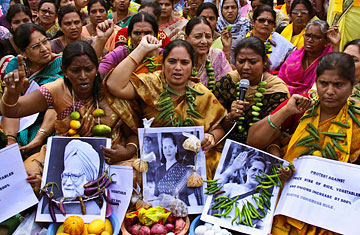
Telugu Desam Party activists shout slogans as they hold portraits of Indian Prime Minister Manmohan Singh and Sonia Gandhi, president of the ruling Congress Party, during a protest in Hyderabad on Jan. 10, 2011
The missiles and the men in uniform were already out for days on the broad avenues of central New Delhi, practicing for India's Republic Day, the country's annual display of pageantry and weaponry. On Jan. 26, Prime Minister Manmohan Singh reviewed the troops in a grand parade and honored India's war dead to mark the official birth of the Indian republic in 1950, when Jawaharlal Nehru was the nation's first Prime Minister. It is on solemn occasions like this one that Singh appears most Nehruvian: serious, intellectual, statesmanlike.
What Singh could really use now, however, is a touch of Nehru the political street fighter. Nehru took the helm of a nation beset by war, poverty and ethnic tension of every variety and kept it together using a mix of cunning, charming and ruthless bargaining. Singh, on the other hand, faces serious but not insurmountable problems — tension in Kashmir, rampant inflation, allegations of corruption in his party — and yet has been unable to find straightforward, pragmatic compromise on any of these.
That lack of political instinct was once part of Singh's appeal. He has never won an election and was appointed Prime Minister by Sonia Gandhi in 2004. When Gandhi, president of the Congress Party, turned to this understated, capable economist instead of assuming the post herself, her decision was hailed as a way to separate the sober business of policymaking from the sordid spectacle of Indian politics. One commentator at the time praised Gandhi's shrewd move to delegate the job to a more experienced manager: "There is no real evidence that she could have handled the administrative and policy challenges of the prime ministership." All this exercise has really proven, however, is the folly of outsourcing governance.
Singh's government has let this year's Republic Day celebration, for example, become overshadowed by a flag-hoisting gimmick staged by the opposition. The Bharatiya Janata Party (BJP) has vowed to raise the Indian tricolor on Jan. 26 in Lal Chowk, the central plaza of the Kashmiri capital of Srinagar. The gesture is an obvious provocation in a place that has witnessed decades of anti-India agitation, and Kashmir's chief minister, Omar Abdullah, has vowed not to permit it. On Saturday, Singh called on the BJP to stay away from Srinagar using what was, for him, strong language: Republic Day, he said, "is not an occasion to score political points ... or to promote divisive agendas." The BJP ignored his limp plea for unity and started its march to Lal Chowk on Monday. On Wednesday, senior party leaders were arrested to stop them from entering the region, according to the BBC.
Singh's government faces a similar crisis of political mojo on corruption. The Telecom Minister he named in 2009 is being investigated for alleged irregularities in the 2008 allocation of mobile-phone spectrum to private companies, a process that India's top auditing agency has called "arbitrary, unfair and inequitable." Other Congress Party leaders are under scrutiny for allegations of overspending in the 2010 Commonwealth Games and appropriating flats in a Mumbai high-rise meant for veterans and their families.
Singh has long been praised for his personal integrity, but leading by reputation alone hasn't been enough to change India's notoriously lax culture of public accountability. In the Prime Minister's New Year address to the nation, he promised to turn a new leaf toward better governance. But Singh has failed to push through any decisive action, like canceling the questionable telecom licenses, and the opposition has halted the functioning of Parliament until he does. "It's extremely serious," says Mahesh Rangarajan, a political analyst and professor at Delhi University. Next month's budget session hangs in the balance, as does Singh's image as a leader. "There is a fear that the sheen will wear off," Rangarajan says.
At the same time, and perhaps most galling, Singh's credentials as an economist have been ignored on the issue where they ought to be most valued — inflation. Food inflation has surged to 16.9% compared to last year, squeezing consumers and potentially slowing India's booming economy. Singh has packed his government with India's best and brightest economists and political scientists, and yet the Reserve Bank of India has dithered on raising interest rates — the obvious way to put the brakes on runaway inflation. Why? The Ph.D.s have been overruled by the politicians, who are loath to do anything that might spoil the party for their friends in big business. "While everyone talks about inflation, no one wants anything done about it," investment adviser Arjun Parthasarathy comments in the Daily News & Analysis newspaper. "Businessmen cannot make profits without growth, government cannot get votes without growth ... So, the unsaid diktat seems to be that inflation, even if it kills the economy, should not hurt growth."
Singh will be 81 when he completes his second term as Prime Minister in 2014, and he could leave behind a profound legacy. He was the architect of economic reforms that have brought years of growth, lifted millions out of poverty and set the stage for India becoming a world superpower. But those gains can easily come undone. By losing the political will to tackle small problems head-on, India's leaders have left the big ones to fester. Only 53% of Indian fifth-graders can read second-grade texts, according to an annual public-education survey. A Jan. 11 study in the Lancet medical journal concludes that the combination of chronic disease and lack of public health care threatens to derail the nation's economic growth. India's next Prime Minister could inherit a nation of undereducated, unhealthy young people with great expectations and dismal prospects. Even Nehru might not be up to the task.
